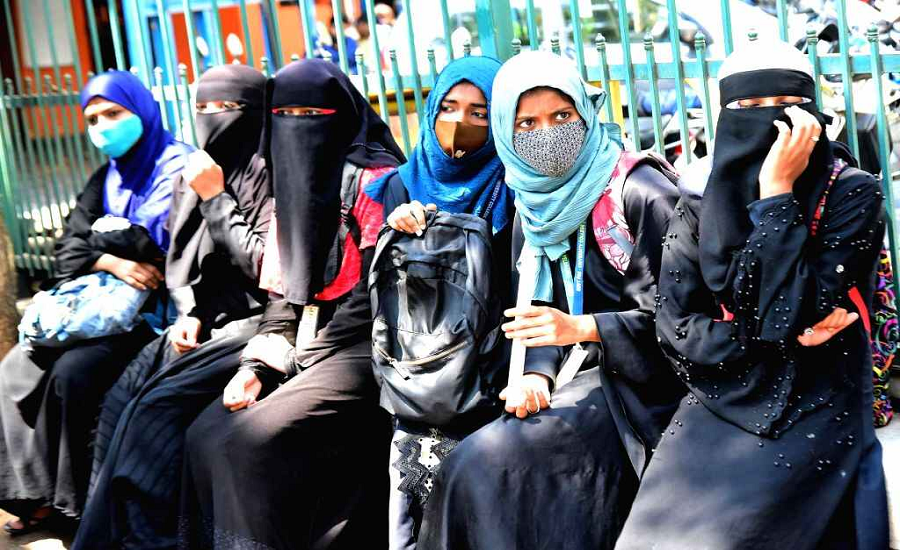
Press Release
WASHINGTON, DC — US lawmakers should stand up in support of Indian Muslim women being forced by Hindu extremists to remove their religious clothing, a leading American Muslim woman’s rights activist has said.
“As a Muslim American woman, as a woman who wears hijab proudly… we need American legislators to stand up and say that women should be allowed to choose what they wear anywhere around the world,” Linda Sarsour, co-founder of Women’s March and an award-winning activist for racial justice and civil rights, said at a Congressional Briefing on Wednesday (March 9).
“What we are seeing is the targeting of Muslims across the country… I’m watching [Muslim] women literally fight off others [who are] literally ripping their hijabs off or telling them in order to set foot into the school, you need to take your hijab off,” she added.
Adding that Prime Minister Narendra Modi’s policies are “divisive” and “extremely dangerous,” Sarsour said Modi was “is allowing for policies across India to target minority groups.”
This Congressional Briefing was organised to commemorate the International Women’s Day, which fell on March 8.
“The BJP and the RSS [Rashtriya Swayamsevak Sangh] are fundamentally Brahmanical and patriarchal… They hate dissent, but they hate dissenting women even more,” said Akriti Bhatia, founding partner of Jan Ki Baat, a public opinion media platform in India. The Hindu nationalist movement targeted not just Muslim and Christian women but also Hindu women, she said. “If you talk about laws like the Love Jihad law, which completely criminalizes Hindu Muslim marriages, interfaith marriages, especially when the man is a Muslim, they essentially believe that Hindu women have no agency or even choosing their life partners and that they have no agency over their own bodies.”
“When we look at the commonalities and identify the patterns of violence, I see the body as the site of violence [and the] impunity of the perpetrators of violence, meaning those who you may look at or imagine as those protectors of the Constitution… turn out to be either silent or tacit supporters of violence; and very often the state becomes a supporter or a silent spectator,” said Rev. Dr. Evangeline Anderson-Rajkumar, a Lutheran pastor in Indiana who is herself a Dalit woman.
“We see the commonality of experiences between the African American struggle, struggle for identity, struggle for justice, the voices for equality and equity that scream for justice and scream for democracy. The basic point is this democracy and diversity are a threat to patriarchy. And if we have to look at the violence that is perpetrated against these bodies, especially the Christian and Dalit bodies… [we] realize that these boundaries are intentionally drawn between us.”
Speaking on the oppression of Dalit communities by upper-caste Hindu extremists, Bindu Ammini, an Indian lawyer and Dalit activist, called upon the international community to create a better support system for caste oppressed groups, particularly women.
“Dalits, Adivasis, and other marginalized women are facing two types of discrimination, one is based on gender and the other based on their religion or caste,” she said. “I [and] other women have… been attacked by these [Hindu extremist] groups both physically and in cyber spaces. This is done as an organised crime, there is no one person doing this. Most of the atrocities against marginalised sections are always done by organised groups… They are trying to destroy our constitutional morality by their efforts to create a Hindu Rashtra (nation).”
Sydney Kochan, Government Relations & Special Projects Coordinator at Jubilee Campaign, a Washington, DC-based Christian advocacy organization, said the Modi government’s discriminatory policies encouraged violence and discrimination against Indian Christian women across India.
“Violence and discrimination against Indian Christian women does not occur in a vacuum but is part of two broader trends: the pattern of violence and discrimination against Christians in general and any individual who does not subscribe to the majority Hindu faith, and the pattern of subjugation of women in a society that devalues them,” Kochan said.
Citing 505 anti-Christian hate crimes in 2021 alone, Kochan said, “A dangerous combination of factors makes it both very easy for crimes to be committed against Indian Christian women with impunity and very difficult for survivors of such crimes to seek justice… Christian women have been targeted by state anti-conversion laws, [which] have been misused to falsely accuse faith minorities of coercive conversion.”
The briefing was co-hosted by Amnesty International USA, Genocide Watch, 21Wilberforce, Hindus for Human Rights, Indian American Muslim Council, International Christian Concern, Jubilee Campaign, Dalit Solidarity Forum, New York State Council of Churches, Federation of Indian American Christian Organizations of North America, India Civil Watch International, Students Against Hindutva Ideology, Center for Pluralism, American Muslim Institution, International Society for Peace and Justice, Association of Indian Muslims of America, the Humanism Project (Australia).

